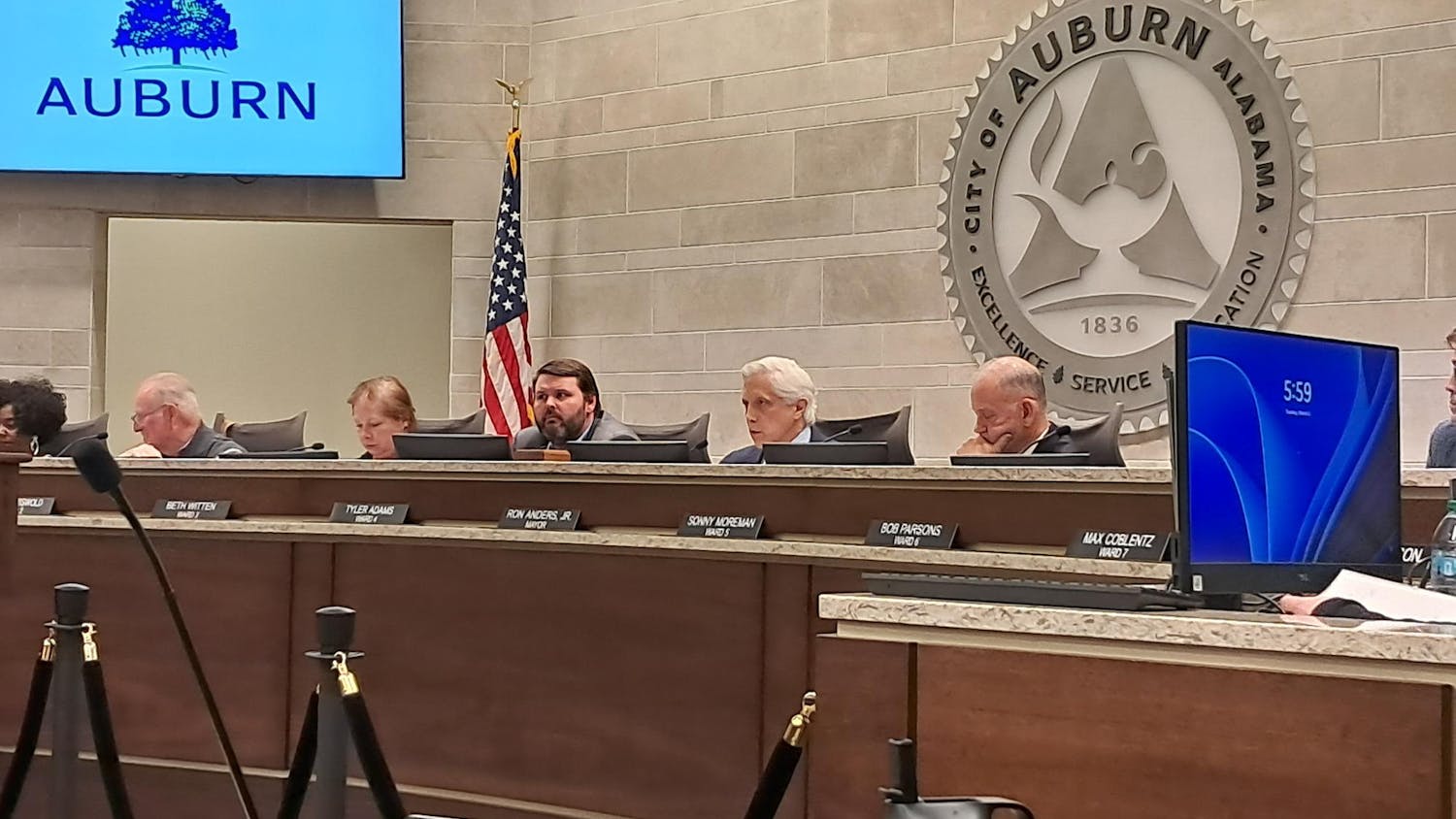As a 33-year-old father, local attorney and businessman, Brett Smith said he was surprised when he discovered his assigned generation class. He didn't realize that his birth year wasn't generation x or y, but the often talked-about "millennial."
Young adults today, millennials, are called lazy, phone-obsessed and politically illiterate. But Brett said he views his generation, the largest generation since the Baby Boomers, through a different lens.
"I'm proud to be a part of that class because instead of accepting the politics of the past and the way the system works, we're actually flipping things on its head and trying to make a difference — saying we're not going to accept what we've done in the past," Brett said in an interview with The Plainsman.
Millennials are the next generation of leaders in this country, he said, and he's proud to be a part of the class. Now, he's ready to take the new ideas of the millennial class to the Statehouse.
Brett announced his candidacy as a Republican for the vacant Alabama District 79 House seat in late June, touting a promise to bring an alternative to Montgomery's "tired and bland" politicians. When he announced, Brett said he would be running on a platform of job creation and investment in education.

But a challenge never bothered him, he said.
When he graduated from Middle Tennessee State University in 2005, Brett said he wanted to pursue a career in journalism but ended up falling in love with public service and law when he worked in Tennessee's public retirement system.
“I learned a lot about public service,” he said. “I know public employees sometimes get a bad rep, but they do a necessary job. I learned a lot because the local people — our firefighters, our police departments, people in local government — they’re the ones who are keeping our communities together."
He ditched the journalism track and decided to get a master's degree in public administration from Tennessee State and then went on to obtain his law degree from Faulkner's Jones School of Law and a master's of law from the University of Alabama School of Law.
When he met his wife, Haley, Brett said his life changed. They met at Jones and fell in love. When they finished their degrees, he decided to move to Auburn with her and together they founded a law practice in the Loveliest Village, Huff Smith Law Firm, which specializes in real estate, small business and family law.
Now, Brett wants to help restore faith in Alabama's scandal-ridden government, but he said he knows he'll need students' help to get there. He doesn't want Auburn students to stay at home and allow a couple thousand die-hard voters determine who will represent them in Montgomery.
"That's not a good example of this district," Brett said. "I think people in college ... they're more politically active. They want to be involved in the process. They want to have a voice, because they're tired of sitting on the sidelines. For me as a candidate, I just want to present myself and let people know who I am, what's important to me and what issues are important to me."
The Republican primary is set for Sept. 13. Three other candidates, including Auburn businessman Sandy Toomer, real estate broker Joe Lovvorn and real estate broker Jay Conner, are also running for the position.
The special election for the House seat was called earlier this summer by Gov. Robert Bentley after Hubbard was found guilty off 12 felony corruption charges. Hubbard was immediately removed from the House seat and will face four years in prison, barring appeal.
"The people of this district are not so much concerned with Hubbard," Brett said. "What they're concerned with is what are we going to do today, what are we going to do tomorrow and how are we going to make a difference in our state."
According to recent campaign finance filings, Brett is behind Lovvorn in fundraising, with Lovvorn's campaign sitting on about $52,000 in funds as of the last report, and Brett's campaign stashing only about $6,500 in available funding. In total, Brett's campaign has raised about $8,000, and Lovvorn's has raised about $60,000.
New campaign finance reports will be released next week.
Brett's views on the issues
A state lottery
Brett said he doesn't support a lottery.
Gov. Robert Bentley recently called a special session of the Alabama Legislature with the purpose of passing legislation that would allow Alabamians to vote on a state-run lottery. Bentley wants that lottery to fund the state's beleaguered General Fund.
The largest recipient of General Fund monies is the state's Medicaid agency, which provides health insurance to low income residents.
"The short answer is: I do not support his plan," Brett said. "I don't support gambling on healthcare. Healthcare is one of the most important things. Especially for the fact that we're talking about Medicaid. This is about healthcare for those that can't afford it. We're going to gamble on that?"
Brett said the lottery would not be a stable source of revenue for the state's General Fund, despite what Bentley has said.
"You can look at numbers that show people play the lottery when the economy's good," Brett said. "People don't play it when the economies not good. It's going to fluctuate. So if we're going to earmark that solely for healthcare, once again, we're going to be in the same boat."
"What we're saying is, when the economy's good, we're going to provide for you, but when the economy's bad, sorry," he said. "Ultimately, it's a selling point by the governor that he's going to put it toward healthcare, but we're really just going to be writing a blank check to the Legislature to have extra revenue. It's troublesome the way it's set up."
Brett said he sees perks in having a lottery, but right now the most important thing is ensuring the state has an efficient government.
Taxes and Medicaid
Brett said the state should take steps to ensure the state's Medicaid Agency works at full efficiency to limit waste, fraud and abuse.
Last year, the Legislature took $80 million from the state's Education Trust Fund — the fund that provides money to all of the state's schools and other education initiatives — and moved that money into the state's General Fund to cover a $200-million shortfall caused mostly by increasing Medicaid costs.
Medicaid is the state's single most expensive program.
Brett said he doesn't see an appetite to raise taxes in the state, so he believes the government should do its best to ensure 100-percent efficiency.
"Now, we've gotten into this dilemma where we've refused the federal dollars for healthcare, and now we're at this dilemma between whether we chose a lottery or look back on the decision we've made in the past," Brett said. "I think that if we were running efficiently we would have enough money for the budget and to cover healthcare."
He said the state should consider expanding Medicaid again as one of many options. If the state were to expand, all of the costs of expansion would be covered by federal money until 2019. After 2019, the state would only be responsible for 10 percent of the costs.
"You've got to look at what's best for your state," he said. "We're not trying to bring in a windfall. We're talking about protecting those who can't take care of themselves. If you're not going to take federal dollars, you've got to create some sort of program that's going to provide."
"It's just a fact, we have people who have needs. We're very blessed in our district, in Auburn, for the quality of life. But if you go outside of our county, and even in parts of our county ... it's not the same. ... I don't think a lottery is the better alternative than taking the funds. If it would save the state money and provide more money, then that's the option we should take."
Education
Brett said the state needs to look at standards, revisit whether or not the state should follow Common Core standard and ensure that schools are properly and equitably funded statewide.
"I think our focus should be on children, not based on their zip code and where they go to school," Brett said. "There have been problems with Common Core, and it coming from a federal bureaucracy. When it comes to education ... the teachers, the administrators and the parents ultimately need to make the decisions. They know what's best for their kids."
Brett said it is important to set standards and for there to be state-wide standards.
"We need to push our students to excel," Brett said. "We've got to look at troubled areas. We've got to make sure we're giving kids opportunities. He didn't choose where he was born. He didn't choose where he goes to school. But he should have the opportunity to have a great education. The difference in your trajectory in life is a great education."
He said he supports the Legislature's decision to raise teachers pay last session.
"I think that's a step, but we've got to make sure we're attracting people to come teach, whether it's in the universities, in colleges, in trade schools, all the way down," he said.
"If we can change the directions of some peoples' paths, we can make a difference in the world and in our state," he said.
Brett said he would look at the ways schools are funded in his first 100 days in office.
Check out The Plainsman's comprehensive coverage of the House District 79 election
- Read a profile on House candidate Jay Conner
- Read a profile on House candidate Brett Smith
- Read a profile on House candidate Sandy Toomer
- Read a profile on House candidate Gage Fenwick
- Read a profile on House candidate Joe Lovvorn
- Candidates talk issues, trust in forum
- Lovvorn refunds $10,000 donation
- House candidate: 'We should concentrate on making our state better' not fighting the federal government
- Fourth Republican announces candidacy for House seat
- Third candidate announces plans to run for Auburn's House seat
- Two hopefuls announce plans to run for Hubbard's vacant seat
- Election announced to replace Hubbard
Do you like this story? The Plainsman doesn't accept money from tuition or student fees, and we don't charge a subscription fee. But you can donate to support The Plainsman.




